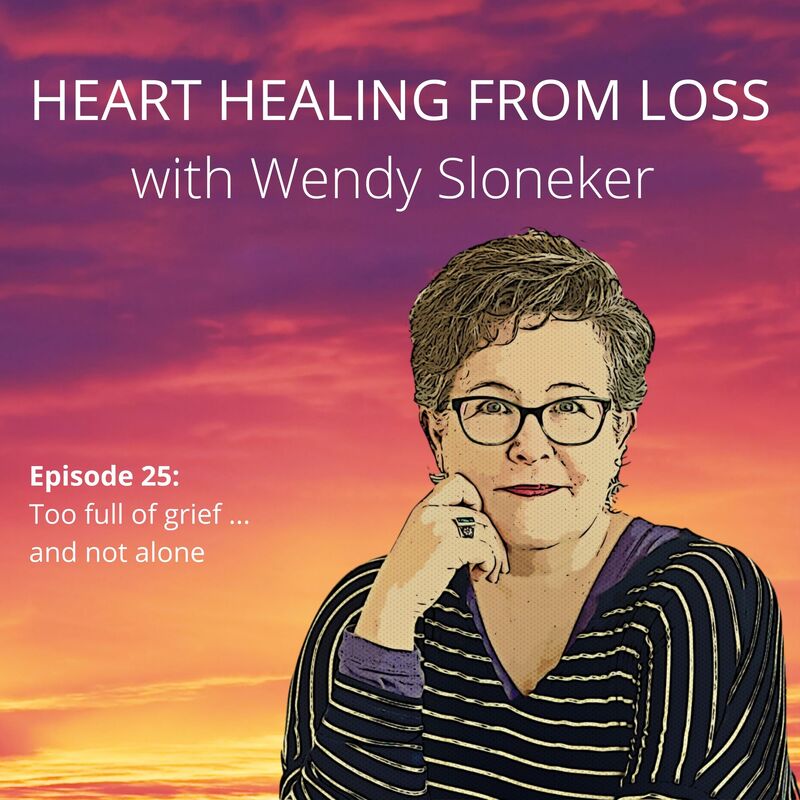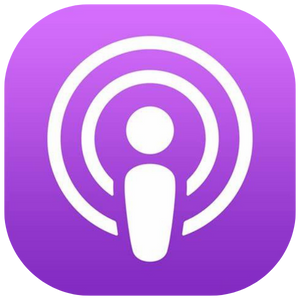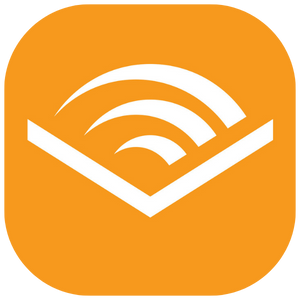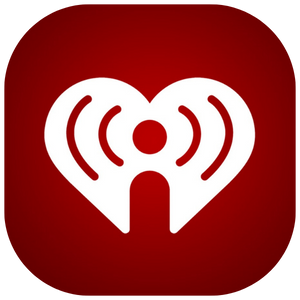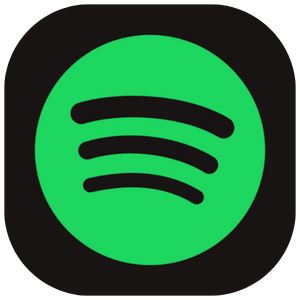Episode 25: Too Full of Grief … and Not Alone
|
The Weight of Grief
When asked to describe the physical feeling of grief, many people say it feels "heavy," like a weight. It is a weight — from small irritations that trickle into our lives like sand to huge, life-changing boulders that threaten to flatten us, grief and losses pile up until the weight is too great to carry. Unburdening Ourselves In this episode, Advanced Grief Recovery Specialist Wendy Sloneker talks about the weight of grief, and how we can start to unburden ourselves, one grain, one pebble, one stone at a time. |
You are Invited:
Have a listen, then find Wendy at HeartHealingFromLoss.com for a free consultation.
Have a listen, then find Wendy at HeartHealingFromLoss.com for a free consultation.
As seen on: |
|
Full Episode Transcript
Wendy Sloneker
You are listening to Wendy Sloneker on the Heart Healing from Loss Podcast, Episode 25.
Hi, it's Wendy. Hello? Hello. Hey. So we are going right into the holiday season in the way that we do the time of this recording. It is the day before Halloween and the days are getting shorter.
And I really wanted to touch Sean while a couple of things, mostly having to do with the multiple losses that we're carrying around unprocessed. And I want this first and foremost to be a message of you are not alone. You are not alone.
My clients were right now, who are coming to me are full. They are full of the emotional pain that comes from experiencing life, including losses, you know, in a 50 50 life, like consider that life could be 50, 50, right? 50% of it is fascinating and just awe inspiring or even peaceful and content and kind of silly giggly, silly light. And the other 50% is have, or disappointing or deaf or sorrowful or irritating girl.
I want you to know that we've been given a lot of tools and there's been a lot of assumptions about what it is to go through life. We've been given a lot of encouragement around attainment and gaining and winning and not so much with the losing or the witnessing of something painful or the traumatic.
So I wanna share tools here with you about exactly that and let the first one be, you're not alone. It's also not a moral issue. You that you don't know what to do with this emotional pain. No, it is not. This is not something to be judged about, to beat yourself up about, I don't care how old this pain is that you are carrying around with you.
If you knew what to do with it and had been taught you, would've done something about it. So I just want, wanna offer that to you as an expansive place, a place where you can hang it all on a hook right now, just like let it be.
I have imagine this coat hook here in my office, and I want you to kind of like shrug out of this heaviness, just hanging on the hook with me. Come on over, sit down in my office, just here, you know, in your imagination that I am painting for you. And I wanna sit on the couch just like together.
Not that you have to be on a couch, I'm not a therapist, but that we're hanging out together for a little bit of time. And just learning about something, about what it is to move through life, which offers us struggle and challenge and pain. Not because of who we are, but because that is what life does. All right. While we're hanging out, I wanna paint a little bit more of a picture. So on the table in front of us, if you will, you can have your feet up on it.
I don't mind at all. There's also like a five gallon bucket and there's a series of different sizes of mini boulders, if you will, and stones and pebbles and sand, okay. So the five gallon bucket, plastic bucket, or maybe it's aluminum, like let's go with aluminum cuz that's got a sound aluminum bucket.
I want you to think about some of your heaviest heaviest losses, like the most painful, the most devastating it could be. The loss of a parent could be the loss of a child. It could be the death of a child or the, the need to free like release your child for adoption. It could be the loss of fertility. It could be your entry point into menopause or your, an inability for your body to conceive.
Naturally, these losses can be very large. So I want you to pick up a couple of those boulders and just put 'em in the pale, put 'em in the pale in your mind and the stones, which are kind kind of they're smaller than the mini boulders, but they're still like kind of like as big as your, I don't know, two hands together sort of cupping, a bigger type stone.
These are also losses, but ones that are not so hugely life changing and ING, maybe these are painful. Maybe these are also couched with blame and anger. This is okay. Find ones that represent those losses and put those in the aluminum bucket. It could be three. It could be 12, make your bucket as big as you need it to be. That's okay too. Okay.
Next up are the pebbles. These are the little disappointments and irritations. Maybe these are changes or just bad timing, things that happen that detour you from where you are going.
But you know, like it's just something of life. It's not as big of a deal or a loss as, as the boulders or the mini boulders or the stones. These are the pebbles. And then <laugh>, I want you to put in like take a look at sand, okay. Sand is myriad, little changes that happen every day.
This includes maybe traffic. This may include, um, last minute changes or a child tells you a about last minute homework or assignments that are due or however many dozen cupcakes need to be brought to school the next day, which may also constitute a pebble or a stone if that's depending on the timing, but this can be sand.
And so go ahead and take a handful of sand or two or three, however money feels right to you. And I want you to put that in your bucket, okay?
Okay. This is what we do with grief and loss is we stow these losses and life events. And lasting changes in our bodies. This is why we feel with many, many losses, all hanging around and unprocessed. This is why there's a feeling of heaviness.
This is why
Because we're storing a lot of pain and a lot of heaviness. And I wanna share with you that it takes a lot of energy to hold this pain. We haven't been taught how to let go. And our brains will freak out.
You may have tried to have released this pain before and your brain has just freaked out and said, it's too much work. It's too risky. It's too scary. Your brain may tell you, Hey, I don't want to get rid of any of this pain because it's too scary to think about how it's gonna feel without it.
It's pain, but it's a familiar pain.
And this is okay, this is a hundred percent okay. If you don't want to remove pain around specific losses or any losses, this is a hundred percent your choice. I really want you to have some knowledge and skills around it being a choice.
So you can choose, like there may be some irritants that are hanging around and taking up room in your body that aresort of like contributing to the feeling of not having any room to handle anything else that life may bring along, even some good stuff.
And for those who really want to be able to feel like they have some capacity and some space inside, this is why I talk about this. If you wanna remove some San or two or three of those pebbles, just to lighten it a little bit, see what that's like, it's valid, it's valid and your brain may not put up such a fight, okay?
But this is how we store loss. We store it as pain in our bodies and there is a negative cumulative effect. Stress is part of it. You may not be surprised when I say that stress is part of it. And stress has a lot to do with a lot of illnesses and chronic conditions in our society.
So what if a little bit of lightness emotional lightness contributed to your overall health? What if a little bit more lightness, let's say five pebbles-worth of emotional lightness would contribute to you feeling less heavy, emotionally.
You having a little bit more energy by releasing what it takes to carry that pain around, but also the energy it takes to carry that pain around. So there's the heaviness of it, but there's also the emotional energy you to hold onto it. What if five pebbles helped you feel like you had more capacity?
Would you go for another pebble? Would you go for another pebble after that? Would you go for a little bit more sand? These are the things like this is the entry point in. You don't have to start with total devastation, but this getting complete with the pain and releasing emotional pain on a mini boulder scale with some of your most devastating losses or biggest losses are taking up a lot of space inside.
We don't talk about this because we don't know how to talk about this.
And like I said, if you had been given or taught the tools, this wouldn't be the issue that, that it is, or this wouldn't be the pain that it is. I should say, how is this landing with you?
Who's talked to you about this before like this, because if we've experienced anything in the last couple of years, it's been change and loss and change, like, let me remind you the change or halt of a familiar routine or pattern are part of grief, loss and heartbreak.
Pre-Covid19
So before 2020 ever came around, you've already been through a lot. We've already been through a lot. It's important that you know this because your lot life experience, even the challenging stuff, even the painful stuff. And you may not like me saying this right now, but even that the most painful, most angering or frustrating or devastating is part of your life experience. You may not want it to be, and that's okay.
You may wish it would've been different or better or more. You may have had hopes, dreams, and expectations that have not gone the way that you wanted. This is part of what we carry terms of grief and loss. We think it should have been a different way. We argue with the past. Maybe we're worried about the future based on the past.
So having tools, can you see how valuable it is to just have the tool and use it when you want it?
It’s not about force or about “having to” do anything
This is not about forcing you to let go of, you know, all the painful stuff, including the memories, including the tenderness. It's actually not possible. Emotional pain may be something that feels very familiar.
And at the prospect of letting go emotional pain may feel like a sort of comfort because it's what, you know, when it is familiar, you're not alone in this either. And sometimes we don't know exactly what we're carrying around in our bodies still.
So I'm wondering if it's useful to entertain the idea of just taking a look, pouring it out on my coffee table in front of a couch that we're both sitting on and just taking a look at it. Yep. Make a mess. Totally. <laugh> mini boulders and rocks and stones and pebbles sand. Yeah. Just to look a, just to let it be there, get some air out on it to help it be less contained than in that pale.
I wonder if that feels useful, the idea you don't have to do anything, but I'm curious even just pouring it out for a few minutes, you can totally sweep it all back into the bucket and the BA and hold it and carry it around. If you want, you can shrug it all.
You can shrug back into it, take it off the hook as you, as I finish up this episode. Yeah, totally.
But notice the heaviness. It's so fascinating.
And you know, truly it's part of our life experience that we continue to carry around with us. Not realizing that the pain of heartbreak and pain, part of grief and loss is something that can be actively decidedly, discerned, lessened by choice. We don't know where those choices are because we haven't been taught.
What is this blowing your mind? I would love to know. And if you would like to know more, I would love it too.
If you would connect with me for a call or just keep listening as you are ready. Right. So you are willing, you are always gonna be invited to right here with me on this podcast.
And I'm just so reaching for anything else that might be useful in this conversation to have, if you're feeling too full for one more thing and the heaviness of multiple losses, including all that happened before 2020 up during 2020.
And then now like through three quarter. So the way of 2021, you're not alone just by learning a little bit about carrying around loss and grief and heaviness in our bodies. This may be useful to you. This may be something that helps you to be willing to just dump your whole bucket of losses, just to look at them, have the pale nearby, for sure. If you want to, but just emptying it to look at them without processing them, without trying to pick them all up or get rid of them.
No, this is about looking at life experience because it does have, even though it's painful, what if you could keep the value and learn how to let go of that emotional pain? That's what I got. That's what I got. That's all I got. And that's what I do. That's what we can do too. I'm thinking of you and with that, I wish you really well.
And I'm excited to talk to you on the next episode too. Okay. Thanks everybody. Bye bye.
Your Invitation
Hi, it's Wendy. Thank you so much for listening. If something resonated or stuck out or sort of hummed with you in this episode, and you want to either talk more about it or have me talk more about it. Let's schedule a connection call. It could be that you are ready to learn how to release emotional pain. This sounds great.
It's great to do. And it's great on the other side, regardless, you're invited.
So if you think it's time for a free 30 minute connection call, I would love to have that with you, go to Wendy heart healing from loss.com to email and schedule, or you can text or call 206-498-8025 and schedule it that way. I would love to talk with you and I would love to listen to you too. Thank you. And thanks for coming back for the next episode too.
You are listening to Wendy Sloneker on the Heart Healing from Loss Podcast, Episode 25.
Hi, it's Wendy. Hello? Hello. Hey. So we are going right into the holiday season in the way that we do the time of this recording. It is the day before Halloween and the days are getting shorter.
And I really wanted to touch Sean while a couple of things, mostly having to do with the multiple losses that we're carrying around unprocessed. And I want this first and foremost to be a message of you are not alone. You are not alone.
My clients were right now, who are coming to me are full. They are full of the emotional pain that comes from experiencing life, including losses, you know, in a 50 50 life, like consider that life could be 50, 50, right? 50% of it is fascinating and just awe inspiring or even peaceful and content and kind of silly giggly, silly light. And the other 50% is have, or disappointing or deaf or sorrowful or irritating girl.
I want you to know that we've been given a lot of tools and there's been a lot of assumptions about what it is to go through life. We've been given a lot of encouragement around attainment and gaining and winning and not so much with the losing or the witnessing of something painful or the traumatic.
So I wanna share tools here with you about exactly that and let the first one be, you're not alone. It's also not a moral issue. You that you don't know what to do with this emotional pain. No, it is not. This is not something to be judged about, to beat yourself up about, I don't care how old this pain is that you are carrying around with you.
If you knew what to do with it and had been taught you, would've done something about it. So I just want, wanna offer that to you as an expansive place, a place where you can hang it all on a hook right now, just like let it be.
I have imagine this coat hook here in my office, and I want you to kind of like shrug out of this heaviness, just hanging on the hook with me. Come on over, sit down in my office, just here, you know, in your imagination that I am painting for you. And I wanna sit on the couch just like together.
Not that you have to be on a couch, I'm not a therapist, but that we're hanging out together for a little bit of time. And just learning about something, about what it is to move through life, which offers us struggle and challenge and pain. Not because of who we are, but because that is what life does. All right. While we're hanging out, I wanna paint a little bit more of a picture. So on the table in front of us, if you will, you can have your feet up on it.
I don't mind at all. There's also like a five gallon bucket and there's a series of different sizes of mini boulders, if you will, and stones and pebbles and sand, okay. So the five gallon bucket, plastic bucket, or maybe it's aluminum, like let's go with aluminum cuz that's got a sound aluminum bucket.
I want you to think about some of your heaviest heaviest losses, like the most painful, the most devastating it could be. The loss of a parent could be the loss of a child. It could be the death of a child or the, the need to free like release your child for adoption. It could be the loss of fertility. It could be your entry point into menopause or your, an inability for your body to conceive.
Naturally, these losses can be very large. So I want you to pick up a couple of those boulders and just put 'em in the pale, put 'em in the pale in your mind and the stones, which are kind kind of they're smaller than the mini boulders, but they're still like kind of like as big as your, I don't know, two hands together sort of cupping, a bigger type stone.
These are also losses, but ones that are not so hugely life changing and ING, maybe these are painful. Maybe these are also couched with blame and anger. This is okay. Find ones that represent those losses and put those in the aluminum bucket. It could be three. It could be 12, make your bucket as big as you need it to be. That's okay too. Okay.
Next up are the pebbles. These are the little disappointments and irritations. Maybe these are changes or just bad timing, things that happen that detour you from where you are going.
But you know, like it's just something of life. It's not as big of a deal or a loss as, as the boulders or the mini boulders or the stones. These are the pebbles. And then <laugh>, I want you to put in like take a look at sand, okay. Sand is myriad, little changes that happen every day.
This includes maybe traffic. This may include, um, last minute changes or a child tells you a about last minute homework or assignments that are due or however many dozen cupcakes need to be brought to school the next day, which may also constitute a pebble or a stone if that's depending on the timing, but this can be sand.
And so go ahead and take a handful of sand or two or three, however money feels right to you. And I want you to put that in your bucket, okay?
Okay. This is what we do with grief and loss is we stow these losses and life events. And lasting changes in our bodies. This is why we feel with many, many losses, all hanging around and unprocessed. This is why there's a feeling of heaviness.
This is why
Because we're storing a lot of pain and a lot of heaviness. And I wanna share with you that it takes a lot of energy to hold this pain. We haven't been taught how to let go. And our brains will freak out.
You may have tried to have released this pain before and your brain has just freaked out and said, it's too much work. It's too risky. It's too scary. Your brain may tell you, Hey, I don't want to get rid of any of this pain because it's too scary to think about how it's gonna feel without it.
It's pain, but it's a familiar pain.
And this is okay, this is a hundred percent okay. If you don't want to remove pain around specific losses or any losses, this is a hundred percent your choice. I really want you to have some knowledge and skills around it being a choice.
So you can choose, like there may be some irritants that are hanging around and taking up room in your body that aresort of like contributing to the feeling of not having any room to handle anything else that life may bring along, even some good stuff.
And for those who really want to be able to feel like they have some capacity and some space inside, this is why I talk about this. If you wanna remove some San or two or three of those pebbles, just to lighten it a little bit, see what that's like, it's valid, it's valid and your brain may not put up such a fight, okay?
But this is how we store loss. We store it as pain in our bodies and there is a negative cumulative effect. Stress is part of it. You may not be surprised when I say that stress is part of it. And stress has a lot to do with a lot of illnesses and chronic conditions in our society.
So what if a little bit of lightness emotional lightness contributed to your overall health? What if a little bit more lightness, let's say five pebbles-worth of emotional lightness would contribute to you feeling less heavy, emotionally.
You having a little bit more energy by releasing what it takes to carry that pain around, but also the energy it takes to carry that pain around. So there's the heaviness of it, but there's also the emotional energy you to hold onto it. What if five pebbles helped you feel like you had more capacity?
Would you go for another pebble? Would you go for another pebble after that? Would you go for a little bit more sand? These are the things like this is the entry point in. You don't have to start with total devastation, but this getting complete with the pain and releasing emotional pain on a mini boulder scale with some of your most devastating losses or biggest losses are taking up a lot of space inside.
We don't talk about this because we don't know how to talk about this.
And like I said, if you had been given or taught the tools, this wouldn't be the issue that, that it is, or this wouldn't be the pain that it is. I should say, how is this landing with you?
Who's talked to you about this before like this, because if we've experienced anything in the last couple of years, it's been change and loss and change, like, let me remind you the change or halt of a familiar routine or pattern are part of grief, loss and heartbreak.
Pre-Covid19
So before 2020 ever came around, you've already been through a lot. We've already been through a lot. It's important that you know this because your lot life experience, even the challenging stuff, even the painful stuff. And you may not like me saying this right now, but even that the most painful, most angering or frustrating or devastating is part of your life experience. You may not want it to be, and that's okay.
You may wish it would've been different or better or more. You may have had hopes, dreams, and expectations that have not gone the way that you wanted. This is part of what we carry terms of grief and loss. We think it should have been a different way. We argue with the past. Maybe we're worried about the future based on the past.
So having tools, can you see how valuable it is to just have the tool and use it when you want it?
It’s not about force or about “having to” do anything
This is not about forcing you to let go of, you know, all the painful stuff, including the memories, including the tenderness. It's actually not possible. Emotional pain may be something that feels very familiar.
And at the prospect of letting go emotional pain may feel like a sort of comfort because it's what, you know, when it is familiar, you're not alone in this either. And sometimes we don't know exactly what we're carrying around in our bodies still.
So I'm wondering if it's useful to entertain the idea of just taking a look, pouring it out on my coffee table in front of a couch that we're both sitting on and just taking a look at it. Yep. Make a mess. Totally. <laugh> mini boulders and rocks and stones and pebbles sand. Yeah. Just to look a, just to let it be there, get some air out on it to help it be less contained than in that pale.
I wonder if that feels useful, the idea you don't have to do anything, but I'm curious even just pouring it out for a few minutes, you can totally sweep it all back into the bucket and the BA and hold it and carry it around. If you want, you can shrug it all.
You can shrug back into it, take it off the hook as you, as I finish up this episode. Yeah, totally.
But notice the heaviness. It's so fascinating.
And you know, truly it's part of our life experience that we continue to carry around with us. Not realizing that the pain of heartbreak and pain, part of grief and loss is something that can be actively decidedly, discerned, lessened by choice. We don't know where those choices are because we haven't been taught.
What is this blowing your mind? I would love to know. And if you would like to know more, I would love it too.
If you would connect with me for a call or just keep listening as you are ready. Right. So you are willing, you are always gonna be invited to right here with me on this podcast.
And I'm just so reaching for anything else that might be useful in this conversation to have, if you're feeling too full for one more thing and the heaviness of multiple losses, including all that happened before 2020 up during 2020.
And then now like through three quarter. So the way of 2021, you're not alone just by learning a little bit about carrying around loss and grief and heaviness in our bodies. This may be useful to you. This may be something that helps you to be willing to just dump your whole bucket of losses, just to look at them, have the pale nearby, for sure. If you want to, but just emptying it to look at them without processing them, without trying to pick them all up or get rid of them.
No, this is about looking at life experience because it does have, even though it's painful, what if you could keep the value and learn how to let go of that emotional pain? That's what I got. That's what I got. That's all I got. And that's what I do. That's what we can do too. I'm thinking of you and with that, I wish you really well.
And I'm excited to talk to you on the next episode too. Okay. Thanks everybody. Bye bye.
Your Invitation
Hi, it's Wendy. Thank you so much for listening. If something resonated or stuck out or sort of hummed with you in this episode, and you want to either talk more about it or have me talk more about it. Let's schedule a connection call. It could be that you are ready to learn how to release emotional pain. This sounds great.
It's great to do. And it's great on the other side, regardless, you're invited.
So if you think it's time for a free 30 minute connection call, I would love to have that with you, go to Wendy heart healing from loss.com to email and schedule, or you can text or call 206-498-8025 and schedule it that way. I would love to talk with you and I would love to listen to you too. Thank you. And thanks for coming back for the next episode too.
